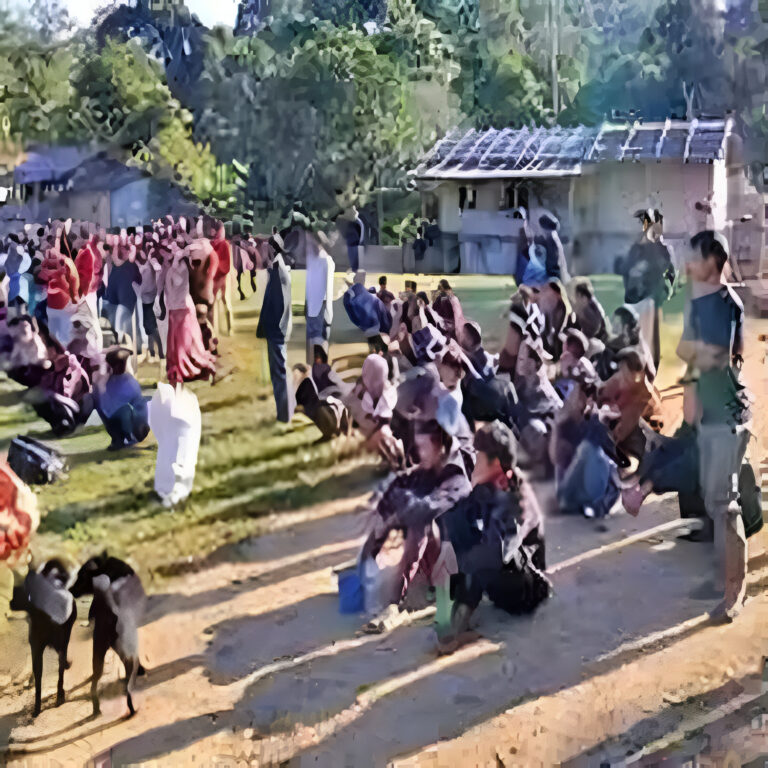Manipur Human Rights Commission Becomes Non-Functional Again: A Call for Action
Summary:
The Manipur Human Rights Commission (MHRC) has once again become non-functional following the retirement of its chairperson, Utpalendu Bikas Saha, on August 19, 2024. This issue has persisted despite calls from organizations like the Centre for Organisation Research and Education (CORE), which highlights the critical need for a new chairperson amidst ongoing conflicts in the state. The lack of proper leadership hinders the commission’s ability to address human rights violations effectively.
Manipur Human Rights Commission: Why It’s Non-Functional Again and What It Means
Have you ever heard the saying, “Justice delayed is justice denied”? Well, that’s exactly what seems to be happening in Manipur right now. The Manipur Human Rights Commission (MHRC), tasked with safeguarding people’s rights, has hit a roadblock once again. Why? Because it doesn’t have a chairperson! It’s hard to believe that such an important body has been rendered powerless at such a critical time, but that’s the reality Manipur finds itself in.
Let’s break down why this is happening, what it means for the people of Manipur, and why the government needs to act fast.
What’s Happening with the MHRC?
In August 2024, the MHRC lost its chairperson, retired Judge Utpalendu Bikas Saha, who had been in charge for just 19 months. Now, without anyone at the helm, the commission can’t function. Imagine trying to drive a car without a steering wheel—it’s impossible to move in the right direction. That’s exactly where the MHRC stands today.
Organizations like the Centre for Organisation Research and Education (CORE) are calling out the government for not filling the vacant position, which leaves thousands of people vulnerable to human rights violations without a clear path to justice.
A Brief History of MHRC’s Struggles
Unfortunately, this isn’t the first time the MHRC has faced such a dilemma. The commission had previously become non-functional in September 2022 when the acting chairperson, Khaidem Mani, retired after serving for four years. It took months before Utpalendu Bikas Saha was appointed, only for the commission to find itself leaderless yet again.
This repeated cycle of inactivity raises a serious question: Why isn’t the government prioritizing the appointment of someone to lead the MHRC? Every time the commission becomes inactive, the people of Manipur lose a crucial ally in their fight for justice.
The Role of the Manipur Human Rights Commission
Let’s talk about why the MHRC is so important. This commission isn’t just another bureaucratic body—it’s meant to serve as the guardian of human rights in Manipur. Whether it’s dealing with cases of police brutality, illegal detentions, or issues of displacement and discrimination, the MHRC steps in to make sure the law protects the people.
Think of it like a referee in a game of soccer. Without the referee, the game would descend into chaos, with no one to enforce the rules. The same goes for human rights; without the MHRC functioning properly, violations go unchecked, leaving the most vulnerable people at risk.
Why is the Delay a Problem?
You might be wondering, “Why can’t the MHRC function without a chairperson?” Well, under Indian law, the chairperson holds significant power in the commission. Without one, the MHRC can’t take up new cases, hold hearings, or even carry out its regular duties.
It’s like having a ship without a captain—sure, the ship exists, but it’s not going anywhere. And in the current situation in Manipur, where human rights issues are rampant, this lack of leadership is more damaging than ever. The people who desperately need justice are left waiting in limbo, unable to seek the help they need.
CORE’s Appeal for Urgency
In response to this crisis, CORE has submitted a formal complaint to the Governor of Manipur, urging immediate action. They’ve pointed out that the state government was quick to issue an order demitting the chairperson’s office, but has failed to authorize an interim leader. This inaction means that not only is the MHRC non-functional, but it also paints a troubling picture of the government’s commitment to protecting human rights.
CORE’s concerns aren’t just procedural—they reflect the lived experiences of people in Manipur who are being denied justice. When there’s no functioning commission, the people have nowhere to turn.
Why the Timing Couldn’t Be Worse
Let’s not forget the broader context here: Manipur is currently in the throes of serious conflict. Whether it’s ethnic violence, land disputes, or governmental crackdowns, human rights violations are rampant. In times of conflict, bodies like the MHRC are more important than ever.
Yet here we are, in the middle of one of Manipur’s most turbulent periods, and the very body designed to protect the people is powerless. It’s like having a fire department with no firefighters—useless in a time of crisis.
The Importance of Human Rights Protections
Human rights aren’t just abstract ideals. They are the cornerstone of any functional society. They ensure that every person is treated with dignity, fairness, and respect, regardless of who they are or where they come from.
In Manipur, where there’s a history of human rights violations, the MHRC has a unique and crucial role. It’s the one place people can go when they feel their rights have been trampled. It’s their shield against injustice.
But when the commission is left inactive, it sends a troubling message: that the state is indifferent to the rights of its people. This, in turn, can deepen distrust between the government and the public, fueling unrest rather than resolving it.
The Road Ahead: What Needs to Be Done?
The solution seems simple, right? Just appoint a new chairperson. But this isn’t just a question of filling a vacancy; it’s about restoring trust in the system. The government of Manipur needs to act quickly, not only to appoint a new leader but to ensure that the MHRC can operate without these constant disruptions.
One suggestion could be establishing a more robust interim system so that the commission doesn’t fall apart every time a chairperson steps down. This way, the MHRC can continue its important work without interruptions.
Another potential solution is more proactive governance. Rather than waiting for human rights organizations like CORE to demand action, the state government should prioritize human rights protections at all times, not just when it’s convenient.
What Can You Do?
You might be thinking, “What can I do about this?” Well, public awareness is a powerful tool. The more people know about the current state of the MHRC, the more pressure can be put on the government to take action. You can share this information, engage in discussions, or even contact local representatives to make your voice heard.
The people of Manipur deserve justice, and it’s up to all of us to ensure they get it.
FAQs About the Manipur Human Rights Commission
- Why is the MHRC non-functional? The MHRC is currently non-functional due to the retirement of its chairperson, Utpalendu Bikas Saha, in August 2024. Without a chairperson, the commission cannot perform its duties.
- What does the MHRC do? The MHRC addresses human rights violations, including cases of police misconduct, illegal detentions, and discrimination, ensuring that people’s fundamental rights are protected.
- Why hasn’t a new chairperson been appointed? Delays in appointing a new chairperson are often due to bureaucratic inefficiencies and a lack of political will to prioritize human rights protections.
- How does this affect the people of Manipur? Without a functioning MHRC, victims of human rights violations have no official body to turn to for justice, leaving them vulnerable and without recourse.
- What can be done to fix this issue? The government needs to prioritize the appointment of a new chairperson and ensure that the MHRC can operate smoothly without these frequent disruptions.




